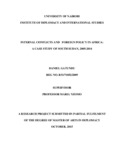| dc.description.abstract | The study examined the root causes and factors behind internal conflicts in South Sudan,
in the period between 2005 and 2014. The overall objective of the study was to examine
the internal conflicts and foreign policy in Africa using the case study of South Sudan,
2005-2014. More specifically the study focus was to examine the factors that lead to
internal conflicts in the South Sudan, determine the relationship between internal
conflicts and foreign policy of South Sudan; analyze the conflict resolution approaches in
South Sudan and explore the best conflict approaches in resolving conflict in South
Sudan. The study made an attempt to establish the main causes of conflicts in South
Sudan and relationship between internal conflicts and foreign policy in South Sudan. The
study used both quantitative and qualitative methods to collect relevant information. The
population, from which the sample was drawn from respondents based at the South
Sudan embassy, residents in Kenya, interstate governmental officers, IGAD, AU,
Students of international studies in Kenya, academicians and South Sudan businessmen.
A sample of 75 respondents was obtained. The primary data collection involved a
questionnaire, discussions with a few selected senior officers in South Sudan Embassy,
and Non-Governmental organization officers residing in Nairobi, Kenya.
On the secondary data the study reviewed vast literature on the subject of study from both
published and unpublished documents. The study established that, Land dispute, natural
resources such as oil as the most significant cause of the conflict among the local
communities living in South Sudan. This was followed by cattle rustling, tribal conflict,
political supremacy, militias, foreign trade and unemployment. The study also established
that internal conflicts in South Sudan had negatively affected her foreign policy. The
study concluded that the conflicts resolution could only be achieved through using a
peaceful approach which has been identified as the best instrument in creating a peaceful
environment in the Republic of South Sudan. | en_US |

